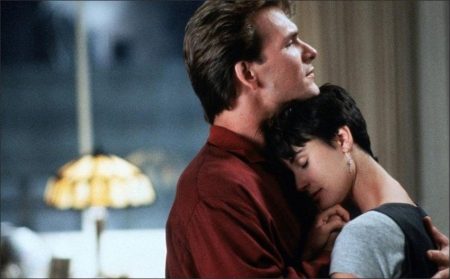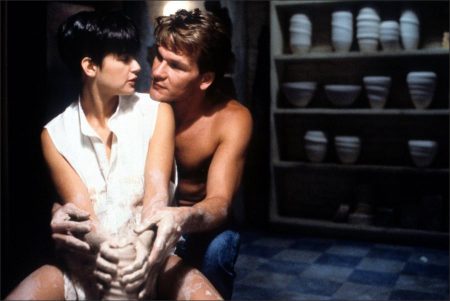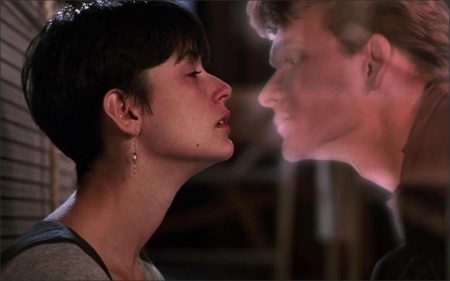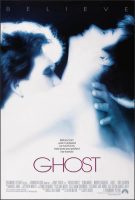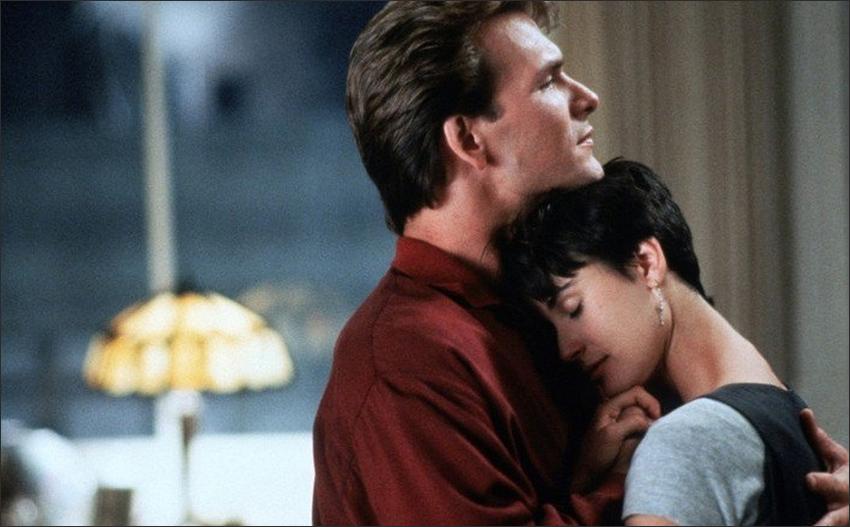Ghost movie storyline. Molly (Demi Moore) and Sam (Patrick Swayze) are New Yorkers living in love. Sam gets kill by a punk who carrying his wallet. When his soul leaves the body, he finds the opportunity to slowly explore life after death. This is an environment in which the souls of the dead exist in the same environment as living beings, but the souls of the living cannot see.
A benevolent ghost helps Sam to accept and adjust to this new situation. The young man is now able to move some objects. But when his former colleague Carl’s dirty clothes and bad plans for Molly come to light, he realizes that the only way to communicate with living things is through a medium. Sam will probably face the most eccentric of the psychics.
Ghost, who has melted the clichés of multiple film genres with great skill, has indeed become perhaps the hottest and most popular film of 1990. In addition to numerous nominations, Whoopi Goldberg was earned her first Oscar, and immortalized Patrick Swayze and Demi Moore as Sam and Molly.
Ghost is a 1990 American romantic fantasy thriller film starring Patrick Swayze, Demi Moore, Whoopi Goldberg, Tony Goldwyn, Stanley Lawrence, Susan Breslau, Martina Deignan, Macka Foley and Rick Aviles. It was written by Bruce Joel Rubin and directed by Jerry Zucker.
The plot centers on a young woman in jeopardy (Demi Moore), the ghost of her murdered lover (Patrick Swayze) and a reluctant psychic (Whoopi Goldberg) who assists him in saving her although the psychic had previously been faking her powers.
The film was an outstanding commercial success, grossing over $505.7 million at the box office on a budget of $22 million. It was the highest-grossing film of 1990. Adjusted for inflation, as of 2015 Ghost was the 93rd-highest-grossing film of all time domestically.
The film was nominated for five Academy Awards, including Best Picture, Best Score and Best Film Editing. It won the awards for Best Supporting Actress for Goldberg and Best Original Screenplay. Swayze and Moore both received Golden Globe Award nominations for their performances, while Goldberg won the BAFTA, Golden Globe, and Saturn Awards in addition to the Oscar.
The music for Ghost was written by veteran composer Maurice Jarre. The soundtrack also featured the 1955 song “Unchained Melody”, composed by Alex North with lyrics by Hy Zaret. That song appears in both instrumental form and in the 1965 recording by the Righteous Brothers. Jarre’s score was nominated for the 1990 Academy Award for Best Original Score, though it lost to John Barry’s work for Dances with Wolves.
Film Review for Ghost
The thing about ghost stories is that they usually have such limited imaginations. If a spirit were indeed able to exist in two realms at the same time – to occupy the spirit world while still involving itself in our designs here in the material universe – wouldn’t it be aghast with glory and wonder? Wouldn’t it transcend the pathetic little concerns of daily life?
To put it another way: If you could live in the mind of God, would you still be telling your wife she’s wearing the T-shirt you spilled the margarita on? “Ghost” is no worse an offender than most ghost movies, I suppose. It assumes that even after death we devote most of our attention to unfinished business here on Earth, and that danger to a loved one is more important to a ghost than the infinity it now inhabits. Such ideas are a comfort to us. We like to picture our dear ones up there on a cloud, eternally “looking down” on us, so devoted that they would rather see what we’re cooking for dinner than have a chat with Aristotle or Elvis.
In “Ghost,” Patrick Swayze plays an investment counselor who is killed by a mugger one night, but remains on the scene in his spirit form to observe as his lover (Demi Moore) weeps and mourns and then attempts to piece her life together. Swayze has an important piece of information he needs to get to her: His death was not an act of random urban violence, but a contract murder. He was about to stumble across a multimillion-dollar scheme to launder drug money, and that’s why he was murdered. Now Moore is in danger.
This plot takes place in the world of upscale Manhattan yuppies. Swayze and Moore inhabit a loft apartment so luxurious that he must be making a fortune at his job (or maybe she’s doing well with her art pottery business). That’s why, after Swayze’s death, Moore doesn’t believe it when a self-appointed psychic (Whoopi Goodberg) contacts her with messages from beyond the grave. What’s amazing is that Goldberg really is able to hear every word Swayze says to her – even though she has no previous record of genuine psychic powers.
That’s how we get around to the description of the T-shirt with the margarita stains. Swayze has to feed Goldberg so much personal information that Moore is forced to believe that the communications are genuine. This he does to a fault. One of the irritations of “Ghost” is that the Moore character is such a slow study. Over and over again, Goldberg tells her things only her lover could possibly have known, and over and over again, Moore disbelieves her – she trusts the villain, instead. We are treading here on the edge of the Idiot Plot.
“Ghost” does, however, make a nice mixture of horror and humor, especially in the scenes involving Goldberg and her sisters (Gail Boggs and Armelia McQueen). The film’s biggest puzzlement involves the exact status of Swayze’s spiritual sojourn in this world.
Is he in heaven’s holding pattern? Must he protect his lover before he can ascend that tunnel of light into the sky? What about his ability to interact with the physical world? At first he walks right through everything, but later, after tutelege from his fellow dead, he learns simple parlor tricks – like picking up a penny – and of course by the end of the movie he is able to beat the hell out of the bad guy.
The movie’s single best scene – one that does touch the poignancy of the human belief in life after death – comes when Swayze is able to take over Goldberg’s body, to use her physical presence as an instrument for caressing the woman that he loves. (In strict logic, this should involve us seeing Goldberg kissing Moore, but of course the movie compromises and shows us Swayze holding her – too bad, because the logical version would actually have been more spiritual and moving.) Then there is the obligatory action climax, necessary in all mass-market entertainments these days, and a particularly ridiculous visitation from the demons of hell.
“Ghost” contains some nice ideas, and occasionally, for whole moments at a time, succeeds in evoking the mysteries that it toys with.
Ghost (1990)
Directed by: Jerry Zucker
Starring: Patrick Swayze, Demi Moore, Whoopi Goldberg, Tony Goldwyn, Stanley Lawrence, Susan Breslau, Martina Deignan, Macka Foley, Rick Aviles
Screenplay by: Bruce Joel Rubin
Production Design by: Jane Musky
Cinematography by: Adam Greenberg
Film Editing by: Walter Murch
Costume Design by: Ruth Morley
Set Decoration by: Joe D. Mitchell
Art Direction by: Mark W. Mansbridge
Music by: Maurice Jarre
MPAA Rating: PG-13
Distributed by: Paramount Pictures
Release Date: July 13, 1990
Views: 841
